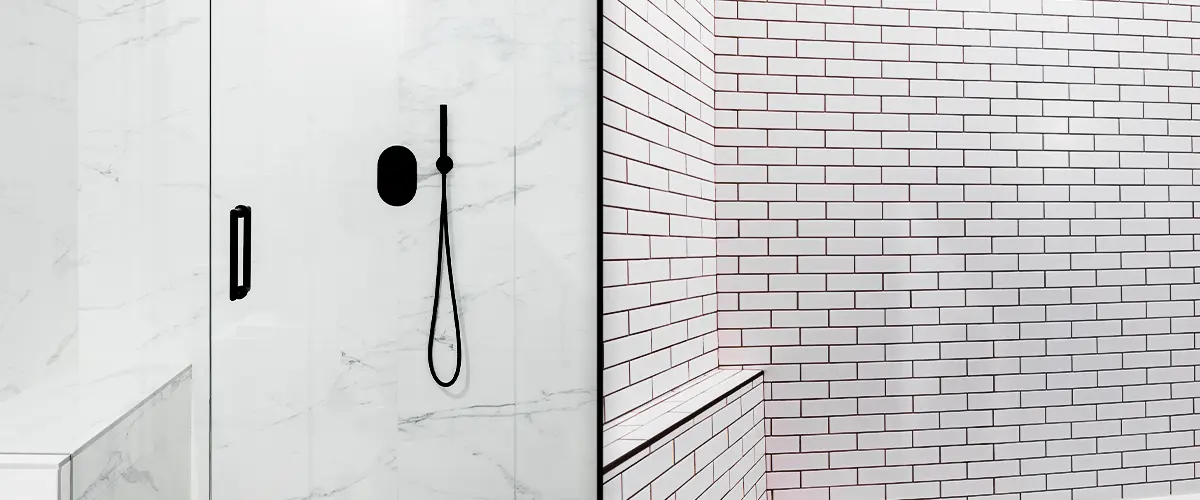Solid Surface Shower Walls vs Tile: Which Is Better?
Choosing the right shower walls can be challenging, especially when you’re torn between popular options like solid surface shower walls and tile. Both choices offer unique benefits, but they also come with their own set of considerations.
Keep reading to make an informed decision!

Benefits of Tile Shower Walls
Tile shower walls offer a wide range of design options. They are also more budget-friendly than many people think.
Variety of design options
Tile shower walls offer a wide range of designs and colors. You can choose from different patterns, shades, and textures. This variety lets you create a unique look for your bathroom.
Whether you want bright colors or subtle tones, there’s a tile option to match your style.
Solid surface shower panels also give you choices in design. These panels come in various colors and styles, including ones that mimic natural stone or wood. They provide a sleek, modern look to any shower space.
With solid surface materials, you can achieve an elegant appearance without the complexity of tile patterns.
Cost-effectiveness
Tiles offer a wide range of prices, making them fit different budgets. You can find basic options that are affordable for many people. But, if you want special designs or high-quality materials, the price goes up.
Tiles need more care over time too. This includes cleaning grout lines which might increase costs.
Solid surface panels come with a higher upfront cost than basic tiles. Yet, they last longer and need less upkeep. This saves money in the long run. Solid surface showers don’t have grout, so they’re simpler to clean and keep looking new.
For more information, you may want to also check our article on shower panels vs. tiles and how these two options affect both cost and maintenance down the road.

Benefits of Solid Surface Shower Walls
Ease of maintenance
Cleaning solid surface shower walls is easier than tiles. You don’t have to scrub grout lines. Just wipe the surfaces with a mild cleaner. This saves time and effort.
Solid surface materials offer a sleek, seamless look and resist mold better than tile, while these stone choices for shower walls can provide an equally high-end aesthetic in certain designs
Seamless installation
Shower walls made from solid surfaces have a clear advantage; these are simple to install. Unlike tiles that demand grout and precise placement, solid surfaces arrive in substantial panels that effortlessly blend together.
This allows for a streamlined installation process and diminished opportunities for water leakage.
Employing this approach enhances the speed of the setup while simultaneously creating an elegant appearance with limited joints. It’s an ideal choice for those aiming to swiftly and effectively improve their bathroom aesthetics, without any compromise on style.

Solid Surface Shower Walls vs Tile Table Comparison
| Benefits of Tile Shower Walls | Benefits of Solid Surface Shower Walls |
|---|---|
| Wide variety of designs, colors, and patterns | Easy to clean, no grout lines to scrub |
| Cost-effective, suitable for different budgets | Seamless installation, fewer joints and gaps |
| Durable and long-lasting with proper care | Low maintenance, resists mold and mildew |
| Customizable aesthetic options for unique looks | Provides a sleek, modern appearance |
Key Considerations in Choosing Between Tile and Solid Surface
Deciding between tile and solid surface for your shower involves thinking about their lasting power and how hard they are to put in. These factors help you figure out which option fits your home better.
Longevity
Tile walls can remain in excellent condition for decades with proper care, although grout lines may become prone to mold buildup over time. To help prevent mold from growing in these grout lines, you can follow these tips for preventing mold in showers.
Solid surface walls have no gaps for dirt or mold. They also last many years without much work to keep them looking good. So, solid surfaces might be easier over time.
Installation complexity
Putting in tile can be hard work. You need to measure, cut, and fit each piece. Then, you have to grout and seal it all. This takes a lot of time and skill. Solid surface walls are easier to put up.
They come in big pieces that cover more space at once. So, the job is done faster with less fuss.
With tile, sometimes things go wrong. If the surface isn’t perfect or if moisture gets behind the tiles, problems start. But solid surfaces stick right onto the wall with special glue and rarely have these issues.
FAQ
Solid surface shower walls and tiles differ in material, installation process, maintenance needs, durability and aesthetics.
In terms of maintenance, solid surface shower walls generally require less upkeep than tiles as they lack grout lines where mold can grow.
While both materials offer good durability, the absence of grout lines in solid surfaces may provide a slight edge over tiled showers when it comes to long-term resilience.
The cost can vary depending on factors like material quality and labor charges; however, installing a tiled shower often tends to be more expensive due to its complex installation process.
Conclusion
Choosing between tile and solid surface for your shower walls depends on what you value more. If you love changing styles and saving money, tiles are great. But if you hate cleaning grout and want a smooth look, go for solid surfaces.
Think about how long you plan to keep it and how much work you want to put into installing it. Your perfect shower wall is out there, based on what matters most to you.
If you live in Arizona or Washington, Offcut Interiors team can help with any bathroom remodeling needs, including installation of new shower. Contact us using the website form or call us at (480) 999-6134.
